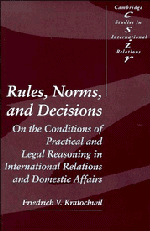 Rules, Norms, and Decisions
Rules, Norms, and Decisions Published online by Cambridge University Press: 01 June 2011
ACTION AND MEANING
How do we understand human action, and what role do norms play in this process? The answers to these questions obviously depend upon our concept of knowledge, and this concept, in turn, is constituted by our ideas about the world we live in and which we experience as reality. One way of approaching this problem is, therefore, to reconstruct images of possible worlds and show their epistemological presuppositions. Such a procedure might enable us to see in turn the limitations of certain concepts of knowledge, based on certain world-images.
In this section I want to follow this procedure and investigate three world-images and their corresponding concepts of knowledge. These worlds are: one, the world of observational facts; two, the world of mental facts; and three, the world of institutional facts. While these world-images are not incommensurable, they do establish different “referents” and emphasize different concepts of knowledge. Consequently, they not only give rise to different epistemological puzzles, but they are also only partially translatable into each other. On the other hand, precisely because certain aspects are translatable, concrete phenomena can often be explained by, or be understood from, the presuppositions of a different concept of knowledge.
The world of observational facts
On the most naive level the world of brute facts consists of “givens” that any theory has to analyze. Scientific progress depends upon an exhaustive description of these facts and upon the establishment of certain regularities among them: so goes at least the inductivist fervor à la Bentham or the positivism of Comte.
To save this book to your Kindle, first ensure [email protected] is added to your Approved Personal Document E-mail List under your Personal Document Settings on the Manage Your Content and Devices page of your Amazon account. Then enter the ‘name’ part of your Kindle email address below. Find out more about saving to your Kindle.
Note you can select to save to either the @free.kindle.com or @kindle.com variations. ‘@free.kindle.com’ emails are free but can only be saved to your device when it is connected to wi-fi. ‘@kindle.com’ emails can be delivered even when you are not connected to wi-fi, but note that service fees apply.
Find out more about the Kindle Personal Document Service.
To save content items to your account, please confirm that you agree to abide by our usage policies. If this is the first time you use this feature, you will be asked to authorise Cambridge Core to connect with your account. Find out more about saving content to Dropbox.
To save content items to your account, please confirm that you agree to abide by our usage policies. If this is the first time you use this feature, you will be asked to authorise Cambridge Core to connect with your account. Find out more about saving content to Google Drive.